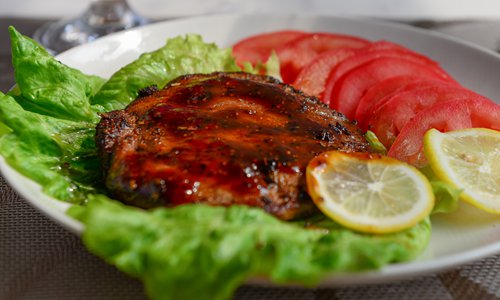SOURCE / MARKETS
China stops beef imports from four Australian companies, due to inspection and quarantine breaches

Black Garlic laced Australian Beef Sirloin Steak, served with Potato and Truffle Slices Photo: IC
China said on Tuesday that beef from four Australian companies failed to meet import standards set by both governments and posed a safety risk to Chinese consumers, explaining an earlier decision by Chinese customs to temporarily halt beef imports from the four traders.
"Chinese customs has found that several batches of beef products from some Australian enterprises breached inspection and quarantine requirements," Zhao Lijian, a spokesperson of the Foreign Ministry, said.
"In order to ensure food safety, the Chinese side has decided to suspend the import declaration of meat products from the four Australian companies with immediate effect, and it asked the Australian side to conduct a thorough investigation," Zhao said.
The meatwork facilities purportedly affected by the suspension include Kilcoy Pastoral Co, two plants owned by JBS, and Northern Cooperative Meat Co.
Efforts to reach the four facilities for comment on the suspension were unsuccessful as of press time.
The Australian Meat Industry Council was also yet to respond to a request for comment.
However, the move, coming after recent deterioration of the bilateral relationship, has been perceived by some Australian officials and Western media outlets as retaliation measure for Australia's demanding an independent probe into the COVID-19 outbreak in China.
Fu Denghu, general manager of Chinese meat importer Haiyunda Trading, told the Global Times that there are normally two reasons the customs would suspend meat imports - food safety issues such as the Mad Cow Disease, or diplomatic tensions.
"Trade ties are usually sensitive to fluctuations in bilateral relations," Fu, who has business ties with many partners from countries including Kazakhstan, Russia, Brazil and Argentina.
"If Australia stubbornly takes hostile actions against China, I am afraid that there will be more import suspensions of Australian products," Fu said.
The move by China could deal a major below to Australian's beef industry, which has a roughly 5-6 percent share in China's mid-level beef market. That share is already dropping in the face of rising market competition, according to Fu.
"The suspension could be a big blow to Australia's beef industry as more than 50 percent of Australia's beef has been exported to China," Fu said.
Fu, who used to import a total of 200-300 tons of beef annually before 2019, gradually decreased the portion of Australian beef since the second half year of 2019, as more countries joined the Belt and Road Initiative, providing more import sources to China.
According to the Australian Broadcasting Crop, the four enterprises make up about 35 percent of Australian beef exports to China.
But Fu was not very worried about the suspension. He stopped beef imports from Australia when the coronavirus outbreak began, and he planned to keep those imports suspended after the pandemic fades.
"As there are many sources available new, and the profit margin on beef from Australia is falling, I will stop importing it from Australia and seek new partners from other countries such as Russia and Brazil," Fu said.


